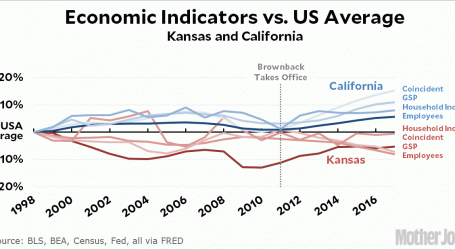Is This the End of Biden’s “Moral Leadership” on Immigration?
Samuel Corum/Sipa/AP
Fight disinformation: Sign up for the free Mother Jones Daily newsletter and follow the news that matters.In 2020, Joe Biden campaigned on the idea that Trump-era immigration policies amounted to “a moral failure and a national shame.” Now, he is backing a border deal that is so aligned with conservative goals that it causes glee: “[W]e would never get [these measures] in a Republican Senate,” Sen. John Thune (R-S.D.) recently gushed, “even with a Republican president.”
Under electoral pressure, and with unprecedented numbers of migrants arriving in the southwest, Biden has made a radical U-turn. He has recently vowed to close the border and now endorsed what would be the most restrictive overhaul of the immigration system in decades.
As a candidate in 2020, Biden set bold goals. His policy proposals, as the Washington Post wrote at the time, came close to a “wish list” for immigrant rights advocates. An empath at heart, we were told, the candidate Biden positioned himself as the right leader to restore a “fair and humane immigration system” and reclaim “America’s moral leadership.” His campaign website promised to stop the “unrelenting assault on our values” ushered in by former president Donald Trump—the deliberate separation of migrant families, the detention of children, and the mass raids by Immigration and Customs Enforcement.
But last month, the president began urging Congress to approve a border deal—as part of the never-ending bipartisan Senate negotiations tied to a White House national security funding request to provide aid to Ukraine, Israel, and Taiwan—that includes concessions immigration advocates have decried as “unconscionable.” The deal is a departure from Democrats’ longstanding commitment to push for the legalization of undocumented immigrants in any legislation advancing border enforcement.
His new promise on immigration is clear: If given the authority, Biden said at a political event in South Carolina, “I’d shut down the border right now and fix it quickly.” And campaign website immigration page that called for moral leadership is now empty. (It features laser-eyed Biden, the words “You found Dark Brandon,” and a request to buy a t-shirt.)
We’ve reached an agreement on a bipartisan deal that includes the toughest and fairest set of border reforms in decades. And it includes support for Ukraine and Israel and provides humanitarian assistance for the Palestinian people.
I urge Congress to pass this bill immediately. pic.twitter.com/jGuiDDxIO9
— President Biden (@POTUS) February 5, 2024
At the center of Biden’s 2024 pitch is the recently announced bipartisan immigration agreement. The embattled $118 billion deal, led by Chris Murphy (D-Conn.), James Lankford (R-Okla.), and Kyrsten Sinema (I-Ariz.), is far from a compromise.
If enacted, the law would create a new expulsion authority to allow the Department of Homeland Security (DHS) for a limited period of time to suspend access to asylum outside of ports of entry when migrant encounters reach an average of 4,000 a day in a week. “When use of the emergency authority is authorized,” the text of the bill states, “the [DHS] Secretary has the authority to prohibit the entry into the US of all individuals, except unaccompanied minors, between ports of entry.” It would trigger mandatory expulsions when that number rose to a daily average of 5,000 over seven days or 8,500 in one day. (When using that emergency authority, border officials would still have to process a minimum of 1,400 asylum seekers a day at ports of entry. Current US law guarantees the right of asylum seekers on US soil or at the border to seek protection.)
Other provisions include expanding expedited removal and detention capacity and raising the bar for initial asylum screenings. At the same time, the sweeping bill would grant eligible asylum seekers expedited work authorization, allocate an additional 50,000 family and employment-based visas a year for five years, offer legal counsel to some unaccompanied minors in deportation proceedings, and provide a pathway to citizenship for Afghan nationals evacuated to the United States. Senate Majority Leader Chuck Schumer has announced plans to have an initial vote on the bill by Wednesday.
“Now, House Republicans have to decide,” President Biden said in a statement on Sunday. “Do they want to solve the problem? Or do they want to keep playing politics with the border? I’ve made my decision. I’m ready to solve the problem. I’m ready to secure the border.”
Many discussions of the deal have focused on Republican hypocrisy. After months of negotiations, Republicans seem wary of supporting even a hardline bill. This is in no small part because Donald Trump says it wouldn’t go far enough in achieving his radical vision. And Trump has worried it would undercut his nativist campaign. “A bad border deal is far worse than no border deal,” the former president posted on Truth Social, adding that the bill would “make Republicans look bad.”
Trump’s pushback against the border deal has left Republicans in a “quandary,” said Senate Minority Leader Mitch McConnell (R-Ky.). House Speaker Mike Johnson (R-La.) has already declared the deal “dead on arrival” in the Republican-controlled House, saying “any border ‘shutdown’ authority that allows even one illegal crossing is a non-starter.”
I’ve seen enough. This bill is even worse than we expected, and won’t come close to ending the border catastrophe the President has created. As the lead Democrat negotiator proclaimed: Under this legislation, “the border never closes.”
If this bill reaches the House, it will be…
— Speaker Mike Johnson (@SpeakerJohnson) February 5, 2024
But even if the deal were to go up in flames, Biden’s embrace of it is telling. It has become increasingly difficult to reconcile Joe Biden-the-president who made that “shut down the border” statement with Joe Biden-the-candidate who called Barack Obama’s record deportations a “big mistake” and referred to migrants as a gift, not a burden. In what now feels like a lifetime ago—the 2020 presidential campaign—one of Biden’s core messages to the American people was that he wasn’t Donald Trump on immigration.
In his first 100 days, Biden vowed to roll back the “zero tolerance” and Remain in Mexico policies, lift restrictions on asylum and refugee resettlement, end for-profit immigration detention, and halt construction of the border wall. In early 2021, he revoked the discriminatory travel ban on travelers from Muslim-majority countries and established a family reunification task force for children separated from their parents and legal guardians at the border. When signing an executive order, Biden talked about removing the “stain on our reputation for what the separations have caused.”
It was an initial period that filled advocates and immigrant allies with a sense of hope.
One of Biden’s first actions was to propose comprehensive legislation that would combine enhanced border enforcement and pathways to citizenship for undocumented immigrants, including the always under-threat Dreamers living in legal limbo. (Facing Republican opposition over what they called “mass amnesty,” that bill never saw the light of day.) And Biden even proposed a 100-day temporary pause on deportations of immigrants already in the United States. (Again, that policy move got quashed, this time in court.)
But the momentum proved difficult to sustain as the president’s ambitions “started to slowly dissipate to the realities of the logistics and the challenges of the politics around those logistics,” a former White House official who asked to speak on the background to discuss issues candidly told me.
The challenges facing the administration, many of which have admittedly been outside of their control, can’t be discounted, as the New York Times aptly documented in a recent story with the headline “How the Border Crisis Shattered Biden’s Immigration Hopes.” Among them were compounded crises in Central and South American countries, a new global migration era pushing an unprecedented number of migrants from all over the world to seek refuge in the United States, and Republican’s determination to weaponize and nourish the issue for political gain, including by using asylum seekers as pawns to make Democrat look bad.
As the perception of the issue of immigration as a political liability became more ingrained—partially as a result of media coverage—the administration appeared to change. Biden began urging migrants not to come to the border. The administration decided to continue to summarily expel migrants through an expanded Trump-era Title 42 and rolled out policies evocative of the Trump days that made it harder to qualify for asylum.
“It is very disappointing to see how things are turning in terms of where this administration is when it comes to policy,” Vanessa Cárdenas, executive director of America’s Voice who served as national coalitions director for the Biden campaign, explained to me a few months ago. “The biggest thing is just a huge missed opportunity to really be able to communicate to the American people a vision of what our immigration system should look like.”
For all the executive actions President Biden has taken on immigration, some would say he failed to sell it to the public and his “carrot and stick” approach ended up frustrating both anti-immigrant hardliners and advocates.
Defenders of immigrant rights hoped Biden would center unapologetically pro-immigrant messages and policies and not cave to Republican’s histrionic cries of “open borders” and “invasion.” Instead, some began to question whether Biden’s policies were even that different from Trump’s after all. At the end of the day, as Democratic strategist and CNN commentator Maria Cardona noted, “The contrast is not as clean as it could be.” In the middle ground, Biden has pleased seemingly no one.
“Immigration policy is governed by a politics of permanent crisis,” the New Yorker‘s Jonathan Blitzer notes in his new book Everyone Who Is Gone Is Here: The United States, Central America, and the Making of a Crisis, “with the border as its staging ground.”
Perhaps Biden did not see that. Perhaps he made the political calculation that moving to the right on immigration to prioritize other foreign policy goals was worth the electoral risk of losing support from the Latino voter base and further alienating progressives. Or, perhaps, Biden’s original sin was to offer a vision for a humane immigration system that turned out to be a promise he couldn’t keep.
Joe Biden is no longer promising voters “moral leadership.” He is promising a crackdown.





